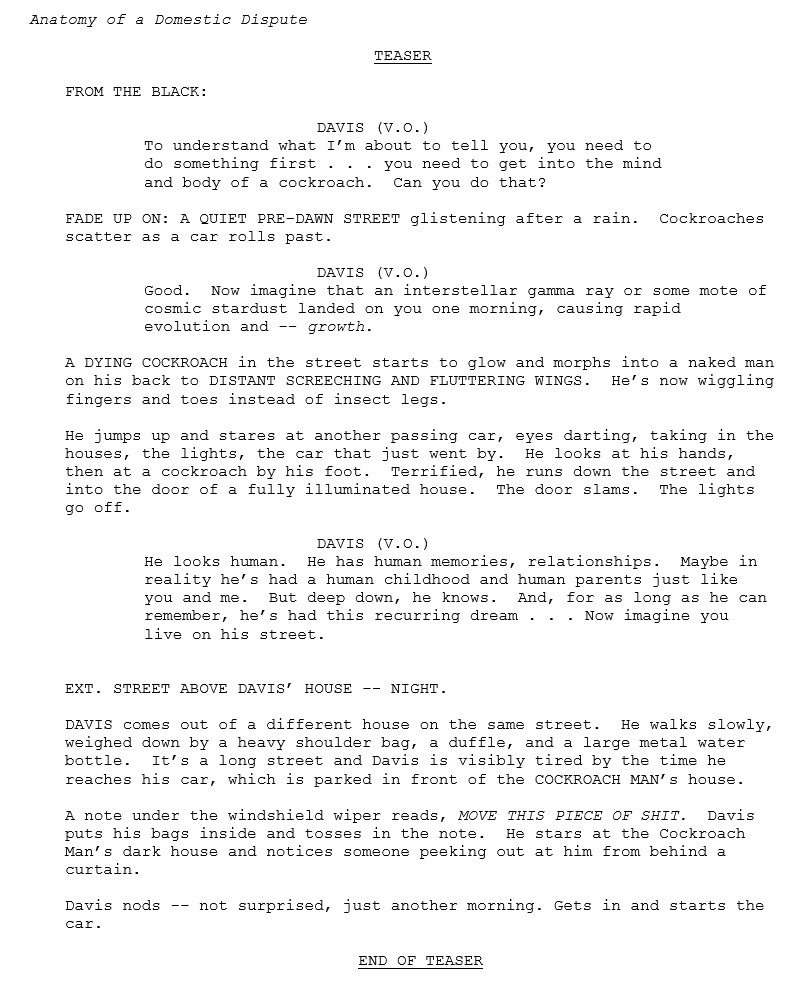
Category: TV writing
The End of Supernatural

Supernatural has come to an end after 15 long seasons. That’s probably for the best. No TV show should run that long. And it had multiple corny, goofy, b-movie impossible-to-believe arcs that sometimes made us groan. But when it was good—and it usually was at some point in every season—especially when it got back to the fable of two brothers taking ghost-hunting road trips in their muscle car through middle America—it was really unique and fascinating.
I found myself keeping up with the show over the years, even at times when there were ostensibly more serious things I wanted to watch. I even read some of the scripts in order to figure out how, exactly, they pulled off certain nigh-unbelievable episodes. I even talked with a teacher of mine about a few of them.
I learned TV writing from a very smart, funny woman who taught me a lot about the business and the machinelike precision that often goes into making a TV episode. It changed the way I thought of television as a creative medium and sharpened my sense of how to make something happen in a scene. Literary fiction writers often have a hard time with plot. They tend to think more about the inner landscape of their characters. But from a TV writer’s point of view, inner upheavals, quiet moments, and realizations emerge in the acting. Good TV writing is plot. And Supernatural’s writers never forgot that.
Often, I’d be watching an utterly goofy episode about a swamp monster eating cheerleaders in central Iowa and I’d realize the immense skill being employed to pack a fully formed dramatic arc into a single episode with surprisingly good character actors filling in the blanks. Nothing about that is simple or easy. Good TV never is.
Say you’ve got 50 pages of script for about 30 minutes of content in a tripartite dramatic structure. An episode needs to sustain tension across commercial breaks, involve most of the cast regulars, and keep within the boundaries of the “series bible,” the style book for the show. In a continuing series, it has to do these things while advancing the broad dramatic arc of the season. Nothing can be wasted. Every available minute must be used. In this highly commercial form of storytelling, time is always money.
There were a few episodes that astonished me in that respect. And I started to follow some of the show’s writers on social media. I’m not much of a fan, but sometimes I’d see some particularly acrobatic bit of dramatic structure and think, damn, who wrote this? Who can build that sort of clockwork mechanism episode after episode, show after show well enough to make a career out of it? I’d describe such a person as highly disciplined, precise, and obsessive. She has to have all the skills with language that every writer has plus a fanatical work ethic, the willingness to commit to someone else’s creative guidelines, and an overwhelming amount of determination to dust herself off and get back into it when Hollywood inevitably hands her a beating. Supernatural seemed to have a number of these ringers in its rotation. You could see the craft.
As someone who stepped into that world, realized how harsh it is, and stepped back out just as quickly, I harbor a deep respect for what goes on in a show’s writers room. I try to hold myself to a similar standard in my work and always enjoy discovering other writers who do the same, even though I’m writing stories and novels and not building three-act chronographs. But a work of great craftsmanship is a wonderful thing to see, whether it’s pretending to be TV b-horror or something more serious.
I’m going to miss Supernatural, as much for these writerly things as for how entertaining and fun the show could be. People talk about the Battlestar Galactica reboot, Breaking Bad, Better Call Saul, and Dexter as being really well-crafted shows in the new golden age of streaming television. And I think they are. But a show like Supernatural sneaks in the back door. It comes dressed as lowbrow pulp, as a jester that doesn’t take itself seriously, and it does such a good job pantomiming and parodying that we overlook its immense skill. Of course, that’s what we were meant to do all along.
